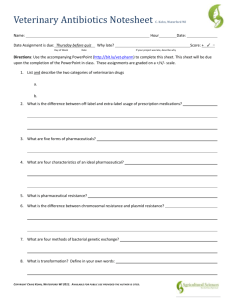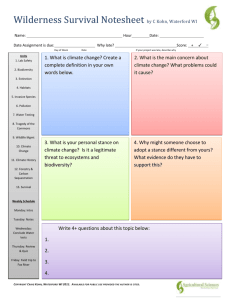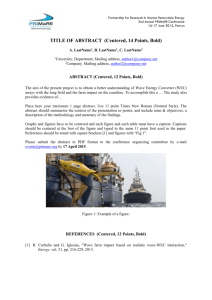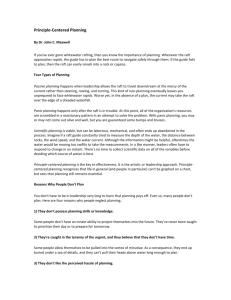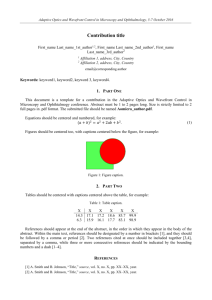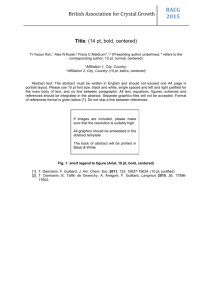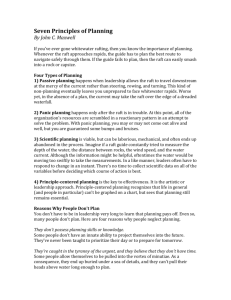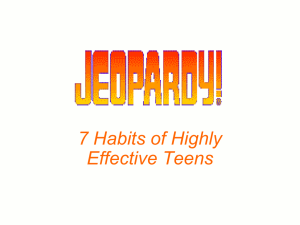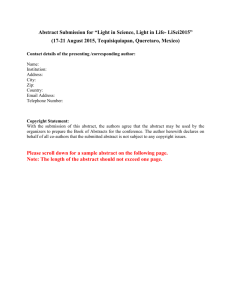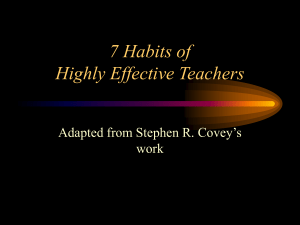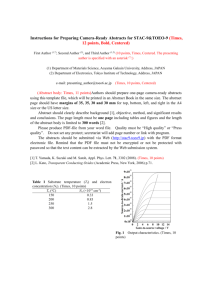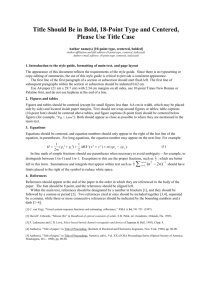Notesheet - Waterford Union High School
advertisement
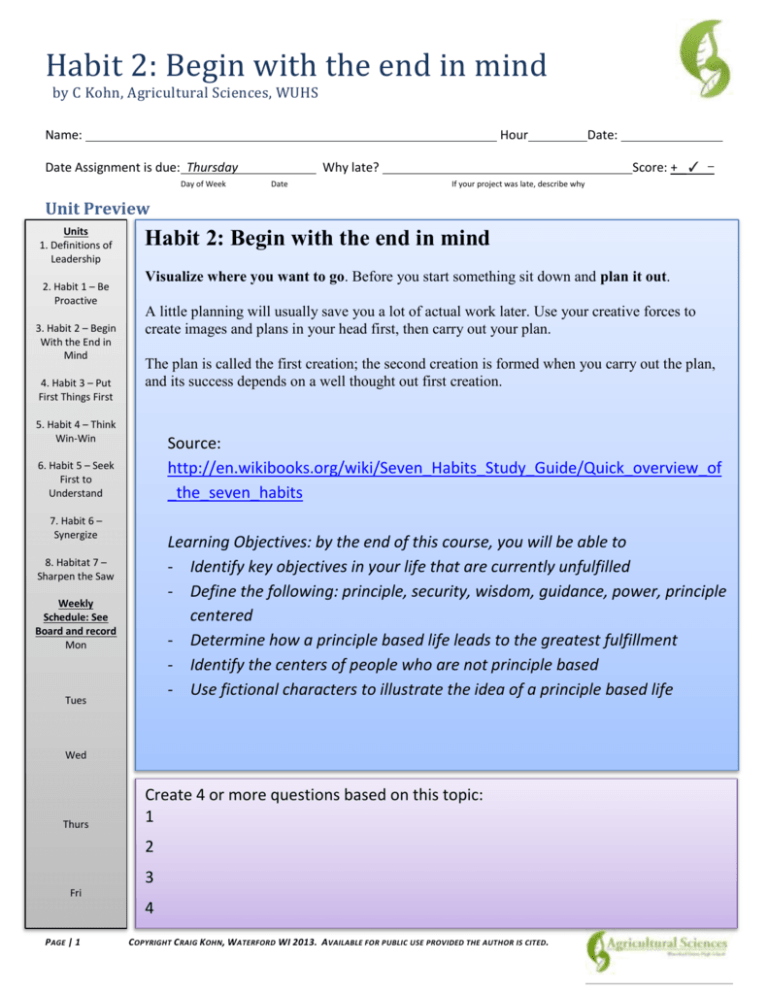
Habit 2: Begin with the end in mind by C Kohn, Agricultural Sciences, WUHS Name: Hour Date Assignment is due: Thursday Day of Week Score: + ✓ - Why late? Date Date: If your project was late, describe why Unit Preview Units 1. Definitions of Leadership 2. Habit 1 – Be Proactive 3. Habit 2 – Begin With the End in Mind 4. Habit 3 – Put First Things First Habit 2: Begin with the end in mind Visualize where you want to go. Before you start something sit down and plan it out. A little planning will usually save you a lot of actual work later. Use your creative forces to create images and plans in your head first, then carry out your plan. The plan is called the first creation; the second creation is formed when you carry out the plan, and its success depends on a well thought out first creation. 5. Habit 4 – Think Win-Win Source: http://en.wikibooks.org/wiki/Seven_Habits_Study_Guide/Quick_overview_of _the_seven_habits 6. Habit 5 – Seek First to Understand 7. Habit 6 – Synergize Learning Objectives: by the end of this course, you will be able to - Identify key objectives in your life that are currently unfulfilled - Define the following: principle, security, wisdom, guidance, power, principle centered - Determine how a principle based life leads to the greatest fulfillment - Identify the centers of people who are not principle based - Use fictional characters to illustrate the idea of a principle based life 8. Habitat 7 – Sharpen the Saw Weekly Schedule: See Board and record Mon Tues Wed Thurs Create 4 or more questions based on this topic: 1 2 3 Fri 4 P AGE | 1 C OPYRIGHT C RAIG K OHN, W ATERFORD WI 2013. A VAILABLE FOR PUBLIC USE PROVIDED THE AUTHOR IS CITED . Directions: Use the accompanying PowerPoint (http://bit.ly/wuhshabit2) to complete this sheet. This sheet will be due upon the completion of the PowerPoint in class. These assignments are graded on a +/√/- scale. 1. If you were diagnosed with a terminal illness and had only 6 months to live, what would you do differently? Name 5 things you personally would do differently after this diagnosis: 1_ 2_ 3_ 4_ 5_ 2. Define security as it pertains to these notes: 3. Provide an example of this principle: _ 4. Define guidance as it pertains to these notes: 5. Provide an example of this principle: _ 6. Define wisdom as it pertains to these notes: 7. Provide an example of this principle: _ 8. Define power as it pertains to these notes: P AGE | 2 C OPYRIGHT C RAIG K OHN, W ATERFORD WI 2013. A VAILABLE FOR PUBLIC USE PROVIDED THE AUTHOR IS CITED . 9. Provide an example of this principle: _ 10. Ebenezer Scrooge had a money centered life. Describe how this impacted his life’s security, guidance, wisdom, and power: a. Security: _ b. Guidance: _ c. Wisdom: _ d. Power: _ 11. As concisely as you can, effectively describe each of the following: Possession Centered: Pleasure Centered: Social Centered: Work/School Centered: Self Centered: P AGE | 3 C OPYRIGHT C RAIG K OHN, W ATERFORD WI 2013. A VAILABLE FOR PUBLIC USE PROVIDED THE AUTHOR IS CITED . 12. In the space below, describe a character from TV or a movie that is NOT principle-centered. Explain what their center is. Then explain how their choice of center affects each of the following areas a. Character: Their Center: b. How does it affect their… i. Security: ii. Guidance: iii. Wisdom: iv. Power: 13. A person who is principle-centered has constant security and does not worry as much about self-esteem issues. Why? 14. Those with other centers tend to negatively view change; for example, someone with a money-center would see change as a risk to their income. Someone who is self-centered views a change as a potential threat to their personal gain. Those who are principle centered see change as opportunity. Why the difference? 15. Principle-centered people are often viewed by others as “grounded”, with predictable, well-thought responses to every situation. Why are principle-centered people most likely to be viewed in this way? 16. Principle centered people are often viewed as wise. Wisdom here is defined as the ability to see connections among seemingly unrelated topics and use these interconnections as opportunities for learning and contribution. Why might someone who is not principle-centered be less likely to see these connections? P AGE | 4 C OPYRIGHT C RAIG K OHN, W ATERFORD WI 2013. A VAILABLE FOR PUBLIC USE PROVIDED THE AUTHOR IS CITED . 17. Those who are not principle-centered tend to have restricted power and limited self-control. Why? 18. Name a character from TV or a movie that is principle-centered. Explain how they are principle-centered. Then explain how their choice of center affects each of the following areas a. Character: b. How do you know they are principle centered?: c. How does it affect their… i. Security: ii. Guidance: iii. Wisdom: iv. Power: d. How does this character handle change? Provide an example: e. How is this person viewed by their friends and colleagues? f. P AGE | 5 If you lived your life more like this fictional character, how would your life change? C OPYRIGHT C RAIG K OHN, W ATERFORD WI 2013. A VAILABLE FOR PUBLIC USE PROVIDED THE AUTHOR IS CITED . Unit Reflection C. Kohn, Agricultural Sciences - Waterford WI 1. Write the 3 topics that were most meaningful to you from this chapter: 1_ 2_ 3_ 2. Create 3 high-level questions related to this material (These questions could be something you still don’t know or questions that reflect understanding that you have now that you did not have before.) 1_ 2_ 3_ 3. Describe a time when you feel you reflected the idea of this chapter in your own personal life: _ _ _ _ _ _ _ 4. How might the idea of this chapter affect your life in the future? Be as specific as you can: _ _ _ _ _ P AGE | 6 C OPYRIGHT C RAIG K OHN, W ATERFORD WI 2013. A VAILABLE FOR PUBLIC USE PROVIDED THE AUTHOR IS CITED .
